“We are like 21st-century slaves here.” What is happening at the Zaporizhzhia NPP in occupied Enerhodar
The Zaporizhzhia Nuclear Power Plant (ZNPP) has had another power outage because of a Russian attack on the night of 8-9 March 2023, which is the sixth such outage since the plant has been occupied. Half a day later, the plant was reconnected to Ukraine's power system. Enerhodar, the city where the nuclear power plant is located, was one of the first cities Russian forces occupied last year.
The occupiers are turning the nuclear power plant into a military base at the moment, hiding behind the largest nuclear facility in Europe. They are holding thousands of employees captive there, banning them from leaving the city and forcing them to sign contracts with Rosatom, a Russian state nuclear corporation. Ukrainska Pravda has managed to speak with both nuclear power engineers that are still working under occupation and those who have left.
They have given accounts of the first days of the capture of the plant, the pressure on employees and the role of the IAEA monitoring mission in what is happening.
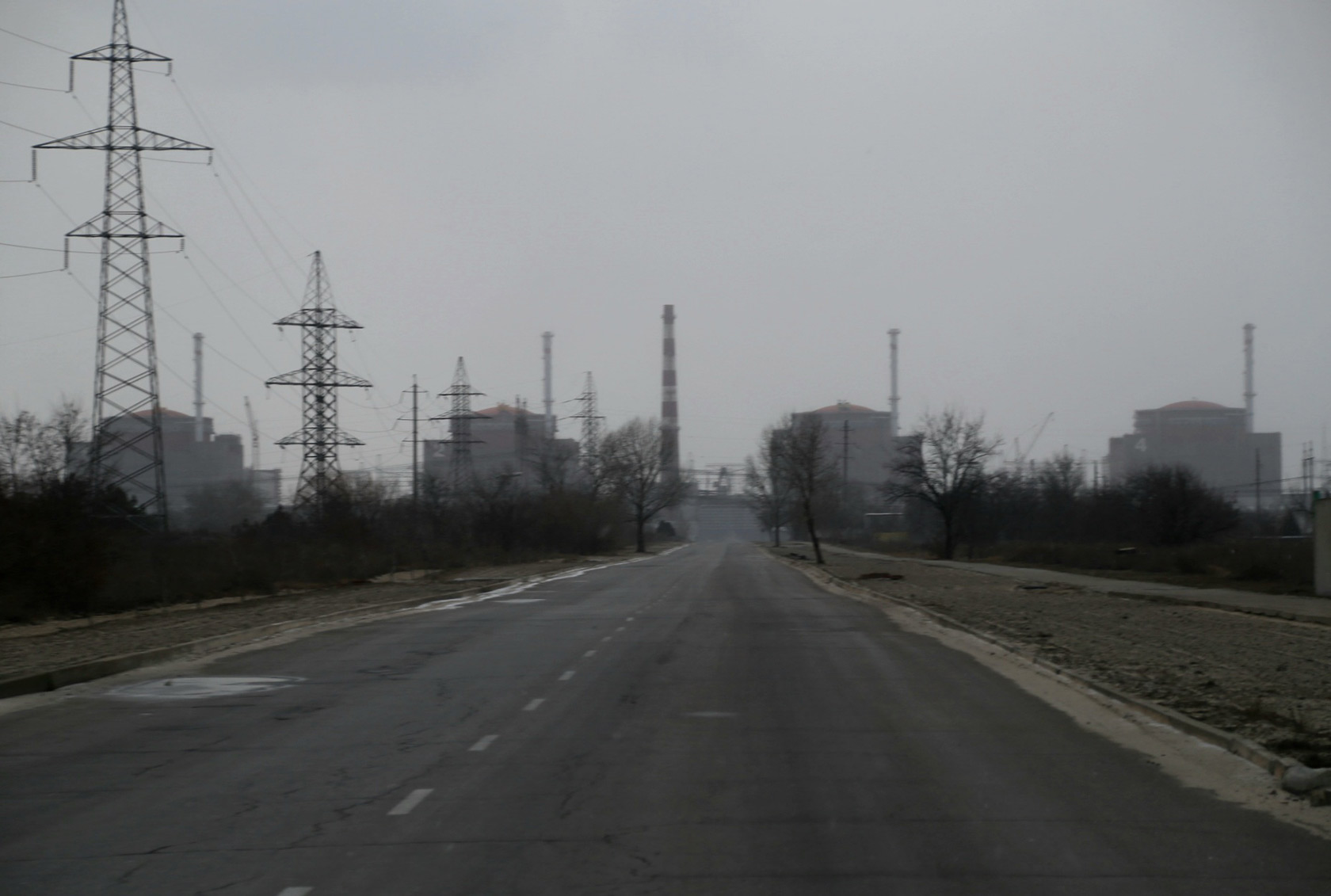 Zaporizhzhia Nuclear Power Plant in occupied Enerhodar. March 2022PHOTO: VIKTORIIA ROSHCHYNA
Zaporizhzhia Nuclear Power Plant in occupied Enerhodar. March 2022PHOTO: VIKTORIIA ROSHCHYNA
"It was scary"
We met with Ihor Murashov, the former head of the ZNPP, in Kyiv not far from the main office of Energoatom, the Ukrainian national nuclear energy company, where he works now.
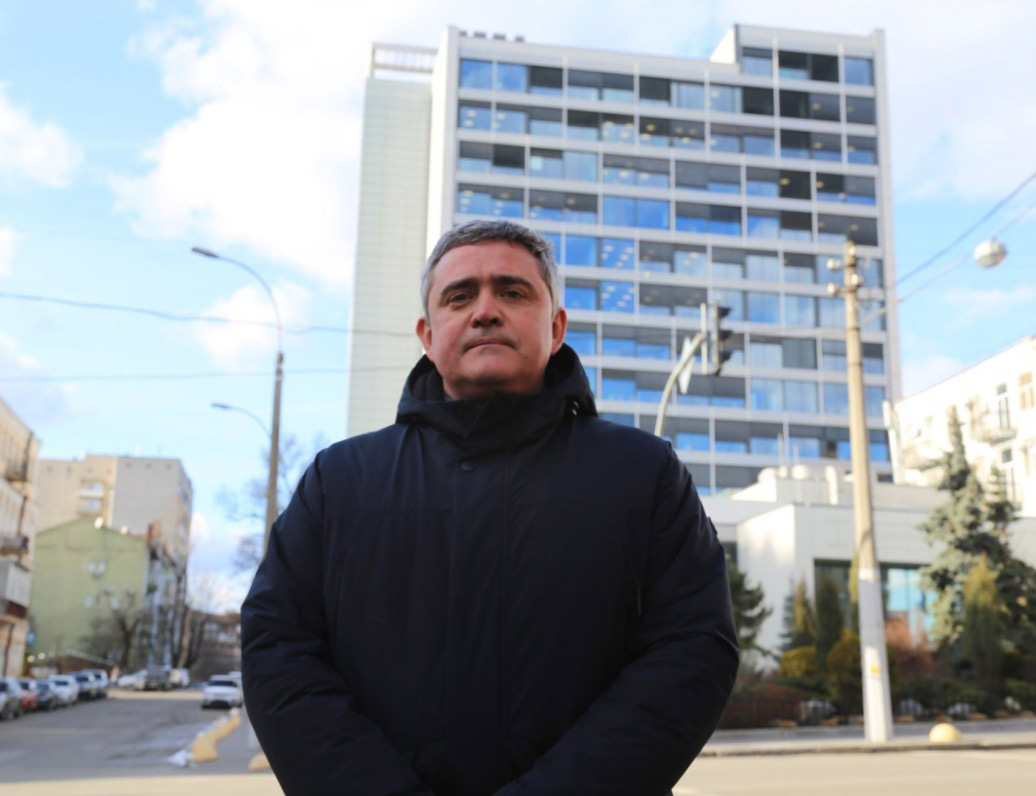 Ihor Murashov, the former head of the ZNPP, March 2023PHOTO: VIKTORIIA ROSHCHYNA
Ihor Murashov, the former head of the ZNPP, March 2023PHOTO: VIKTORIIA ROSHCHYNA
The occupiers abducted Murashov and held captive for several days in October 2022, and then "deported" him to the city of Zaporizhzhia because he had refused to cooperate with them. Prior to that, he was working in Russian-occupied Enerhodar for seven months.
"It was scary, I am telling it like it was," Murashov admits. Russian invaders broke through to Enerhodar on 3 March 2022, at approximately 22:00. At that moment, Murashov was in the ZNPP crisis centre towards which Russian tanks were heading.
"We thought they would block us but they would be smart enough not to shoot. But they started shooting chaotically, there were sparks from bullets that hit power transmission lines, one of the training centre buildings started burning..." he says. Power engineers shouted to the occupiers in Russian from the crisis centre: "Stop firing at the nuclear facility."
The Russians ignored those calls. In order for the world to see what was happening, the power engineers turned on online video broadcasting and kept working under attacks.
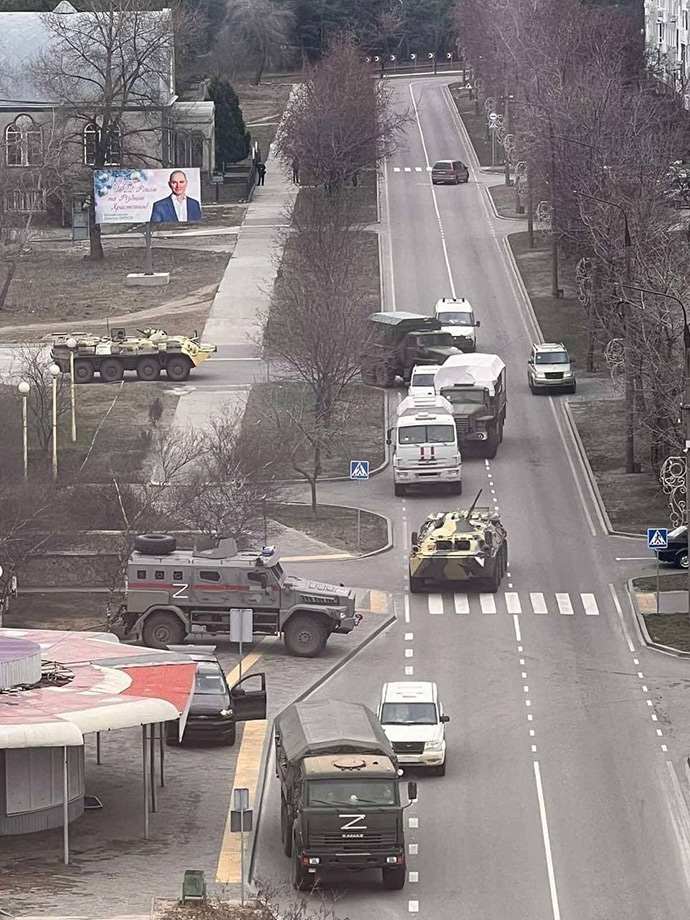 Russian equipment in occupied Enerhodar, March 2022PHOTO: LOCAL RESIDENTS
Russian equipment in occupied Enerhodar, March 2022PHOTO: LOCAL RESIDENTS
"We made a decision that night to shut down two of the four operating power units," Murashov recounts. After that, long months of operating under occupation started.
The Russians were trying to persuade Ihor Murashov to cooperate with them all the time. But after he refused to comply multiple times, special forces from the FSB abducted him. "With a bag on my head and cuffs on my hands, they brought me to the Security Service of Ukraine building.
They were persuading me to collaborate, then I needed to provide them with written answers to questions, and then they gave me a text [confession in cooperation with the Security Service of Ukraine and the fact that it was the Armed Forces of Ukraine who attacked the plant - ed.] and we recorded a video," Murashov says. Representatives of Russian secret services interrogated Ihor while their special forces guarded him. Murashov was held captive for four days.
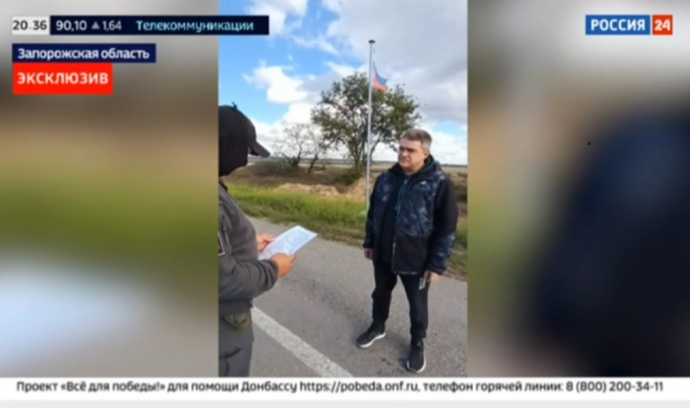 The occupiers expelling Ihor Murashov in Vasylivka, October 2022SCREENSHOT FROM THE VIDEO
The occupiers expelling Ihor Murashov in Vasylivka, October 2022SCREENSHOT FROM THE VIDEO
"They did not torture me, they wanted to break me psychologically. But I told them I would not be a traitor," Murashov adds. "The world's community started getting involved, Zelenskyy, Macron, Grossi, so my detainment was light in comparison with my people who went through 'pits' [torture chambers - ed.] and all the circles of hell," Murashov says.
Ihor Murashov has said that one of their methods to affect those they held captive psychologically was the phrase "You are nuclear engineers, you have to think of safety, not politics." After receiving permission from the so-called leadership in Melitopol, Murashov was taken to Vasylivka. Russian invaders read the so-called verdict regarding his expulsion from the occupied part of Zaporizhzhia Oblast.
Murashow made his way on foot to Zaporizhzhia without his documents or phone. Ukrainian soldiers met him halfway through.
Under occupation
11,000 employees were working at the Zaporizhzhia NPP before it was occupied, which is a quarter of the total population of Enerhodar. About 6,500 power engineers remain in the city today.
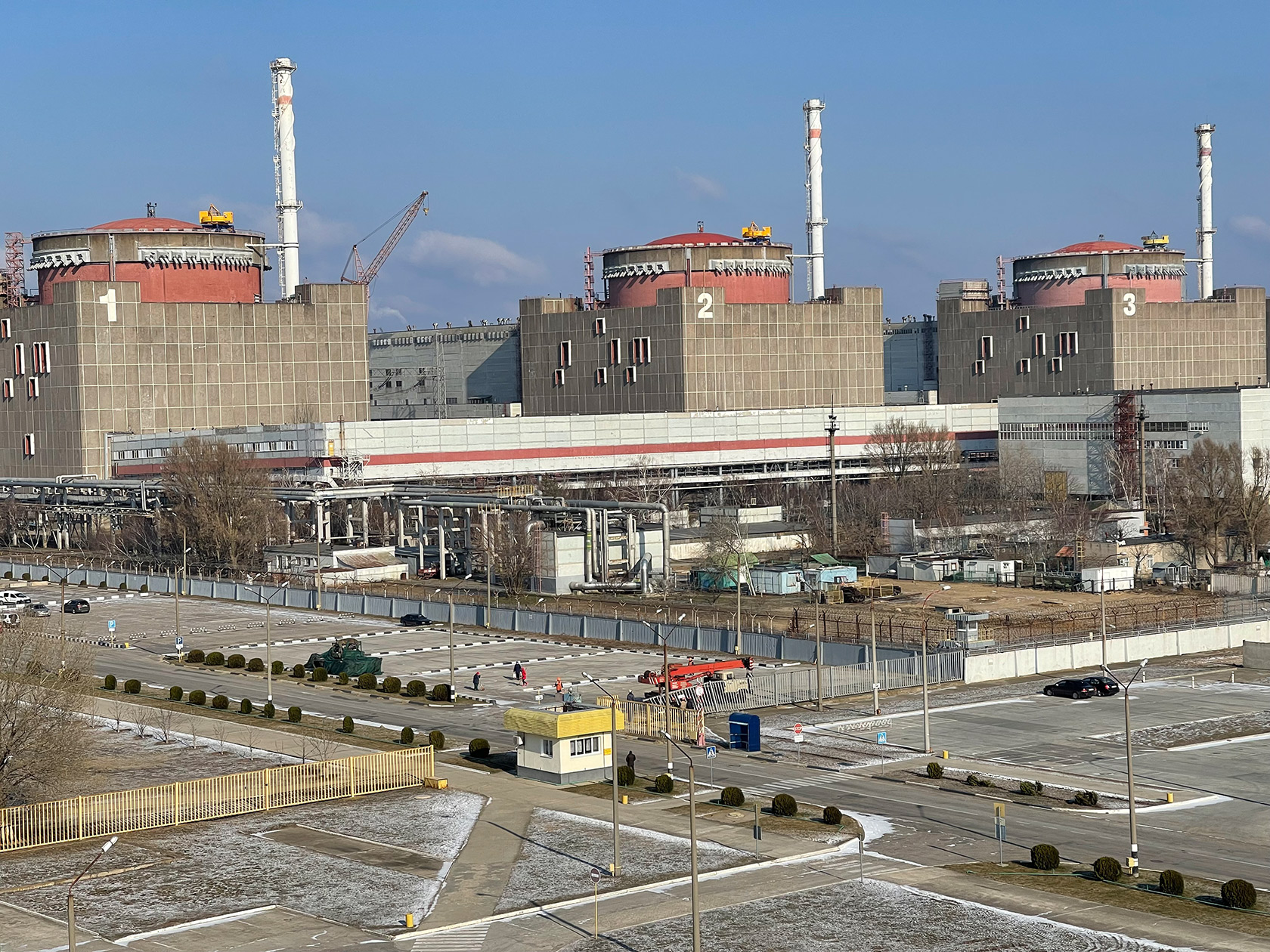 Occupied ZNPP, March 2022PHOTO: THE ZNPP EMPLOYEE
Occupied ZNPP, March 2022PHOTO: THE ZNPP EMPLOYEE
About 2,500 people signed contracts with the Rosatom - either voluntarily or under pressure. Some of them went to being forcibly laid off and are staying at home. Some of them go to work in order to ensure the plant has a sufficient level of radiation safety but refuse to sign any agreements with the occupiers.
"Mostly those who stayed in the city and are working with the Energoatom are not separatists. People understand they need to be there," Oleksii Melnychuk, the ZNPP specialist whom we met in Zaporizhzhia, says.
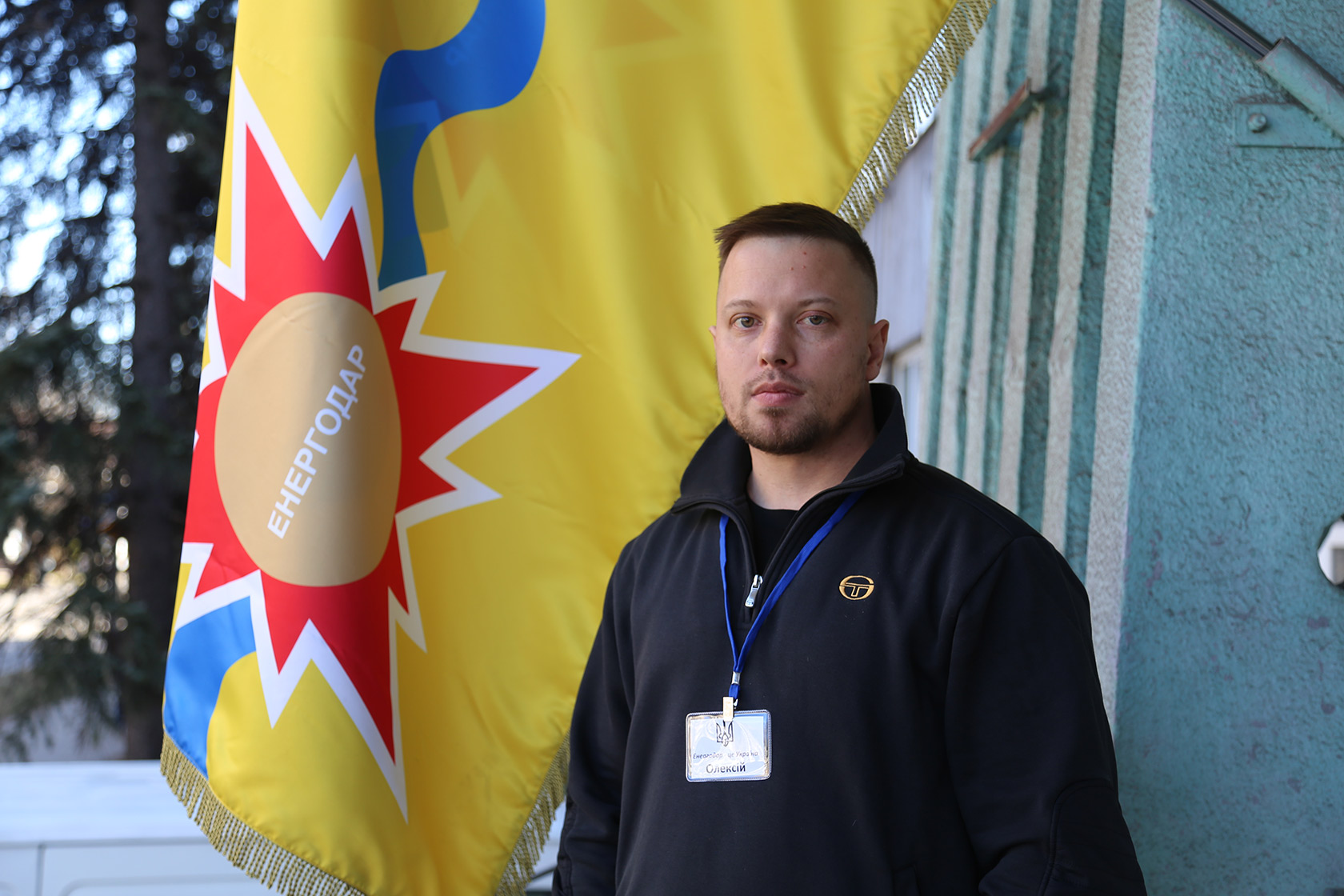 Oleksii Melnychuk, the ZNPP specialist, March 2023PHOTO: VIKTORIIA ROSHCHYNA
Oleksii Melnychuk, the ZNPP specialist, March 2023PHOTO: VIKTORIIA ROSHCHYNA
Russian forces closed the "road of life" from Enerhodar to Zaporizhzhia in December 2022. From now on, it is possible to get to the territories controlled by the Ukrainian government only through occupied Crimea and the territory of Russia.
However, this does not refer to nuclear engineers, because all their names are marked on so-called red lists at all Russian checkpoints. "We are like 21st-century slaves here. This is not a plant anymore, it is some military base. There are many more soldiers now, they walk around here like they are at home," S., a nuclear engineer who is still working, says.
"The situation becomes more and more critical every day. When you go home after an evening shift, they can stop you and ask: 'Why do you still have a Ukrainian-issued passport? Why have you not signed a contract with Rosatom?'," S. continues.
The occupiers blocked the passes of some employees in order to make them sign contracts. T., another nuclear engineer, is currently at home. He says only a few people voluntarily agreed to collaborate with the occupiers, and those who refused are put under pressure.
"A Rosatom employee calls you in for 'preventative conversations'. A person from the FSB is there, too. At first, they convince you: 'Switch to our side.
There will be no Ukraine here anymore, Russia is here, you will not have a place to work, and you have families.' You cannot leave the city, you are being held captive," T. describes the situation.
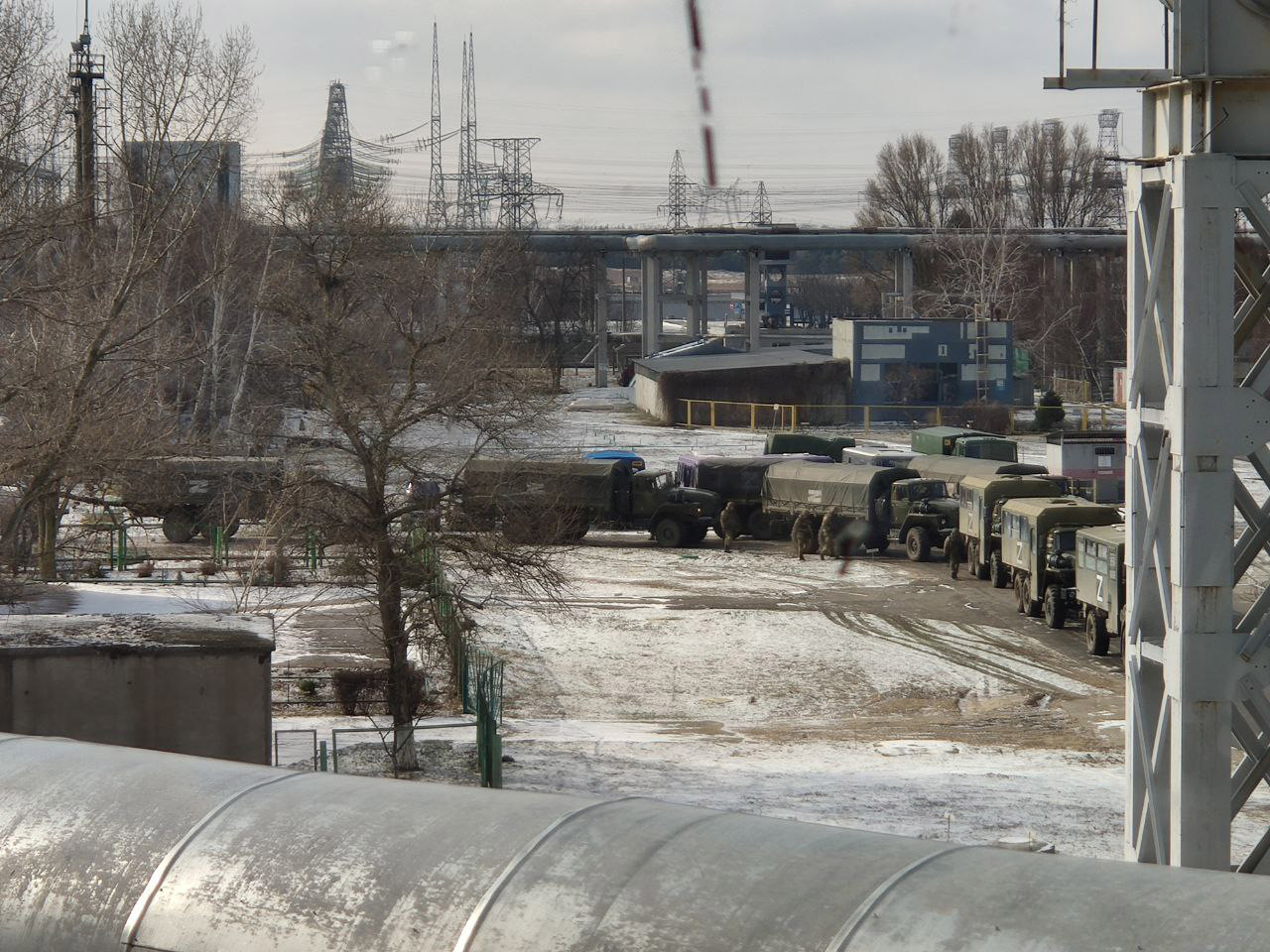 Russian equipment near the ZNPP, March 2022PHOTO: THE ZNPP POWER ENGINEER
Russian equipment near the ZNPP, March 2022PHOTO: THE ZNPP POWER ENGINEER
"They use children to put pressure on people. They say: 'If you do not sign, we will take your children and deport them.'," S. says. If an employee categorically refuses to cooperate with the Russians, they can take him or her "to a pit", as the nuclear specialists call it.
"They took one of our colleagues. We do not know what they did to him there. He got out and signed a contract, but he is all 'grey' [pale - ed.].
Obviously, he did it under pressure," N., a woman who is working at the plant and remains under the occupation, recounts. Despite the Russians' statements that they will bring in their own staff, the occupiers still hold on to Ukrainian specialists. After the accident at the Japanese Fukushima nuclear power plant in 2011, the ZNPP was modernised with the participation of Ukrainian companies.
"They produced exclusive equipment for us, and only we [the ZNPP employees - ed.] know how to use it," Ihor Murashov stresses. "When we told them we would not sign contracts, the FSB officers asked what option would be acceptable. We said: 'Bring your personnel here.' And the FSB people themselves replied to us: 'You do understand that's impossible, don't you?' That is, they understand they will not find that many people," N. says.
Personnel from the Kalinin and Kursk Nuclear Power Plants were brought to the station recently, say nuclear workers under occupation. "They brought these "guest workers" to the 5th and 6th power units. They said that they were bringing 200 people, then 40, but then 9 arrived," says S., who still works at the station.
Dmytro Orlov, the mayor of Enerhodar, says that due to the lack of personnel, the occupiers are recruiting people in Enerhodar.
 Dmytro Orlov, mayor of Enerhodar, March 2023PHOTO: VIKTORIIA ROSHCHYNA
Dmytro Orlov, mayor of Enerhodar, March 2023PHOTO: VIKTORIIA ROSHCHYNA
The occupiers are trying to encourage people with rapid career growth. "So he was an electrician, but now he's a foreman," says S. "But this position requires experience, knowledge, and skills. But, of course, some people agree." Money was also a motivation. "These 'signatories' were chasing after salaries.
They were paid both Russian and Ukrainian salaries for three months," explains B. Electrician Roman Matviichenko and engineer Oleksii Brazhnyk are among the deported nuclear workers who never reached Ukrainian-controlled territory. FSB officers were also looking for those nuclear plant employees who held back the Russian offensive in March of last year at Ukrainian checkpoints.
They found video from the scene and identified the participants. Worker V., who was at the checkpoint in March, was taken to the river by the occupiers, tortured and threatened with execution. According to V., the torture lasted for three hours, then the man was taken out of town "to be shot."
"The soldier allegedly gave me my last cigarette, put a gun to my head, and after about 15-20 seconds, hit me with his leg in the chest and told me to count to 50. He added that come Judgement day, I would put in a good word for him, allegedly for not killing me." S., an employee of the nuclear plant, was abducted by the Russian FSB in the autumn during his work shift.
They demanded that he hand over his weapons and turn in pro-Ukrainian residents. "They called me to the manager's office, introduced themselves as being from the FSB, and took me home for a search. They were in civilian clothes, without masks - 30-35 years old.
They were accompanied by a special forces team in military uniform. They tied my hands and put a bag on my head. They strangled me, then tortured me with a hot iron and beat me," recalls S.
After that, he was taken to a cell at the police station, where he was again interrogated, beaten and tortured with electric shock. A month and a half later, the nuclear worker was taken to Vasylivka and deported. "If they see that a person hesitates, then they continue the "conversation".
If a person does not hesitate, there are two options: either he will stay alive, if he is lucky, or he will not stay alive. There are many methods. They are taught this..." says S.
Pro-Russian nuclear workers often turn in their colleagues to the occupiers. Employee R., who was only able to escape from the occupied city this year, fell into FSB hands in such a way. "They came in civilian clothes, wearing masks, aged 25 and 40.
They said: "Well, why are you scaring people with criminal liability for signing contracts (with Rosatom - ed.)? - recalls the nuclear worker and says that the day before, he had said the phrase to his colleagues: "You can't sit on two chairs." "They take me to the office. And here comes another one, also wearing a mask.
He hit me so hard that I jumped out of my chair. He is about 40 years old. His eyes are so empty, you can see that he is an executioner," says the man and adds that scissors, an awl, forceps and a bag with the inscription "Surgeon" were already laid out on the table.
"He was the surgeon. Then he pinched my nose with forceps and the beating continued. Then he put a knife to my ear, scissors, told me how he would be removing my scalp, and said that I would be his 28th to swim to Kakhovka", says employee R. ["Swim to Kakhovka" refers to the occupiers' practice of throwing the bodies of those they have killed into the Dnipro River which flows past the ZNPP to Kakhovka.]
The Russian named "Surgeon" also told him how he had graduated from Belgorod Medical University, worked as a doctor, but he didn't like it, and he joined Wagner PMC (Private Military Company). Finally, R. was forced to record a video. "They would beat me and tell me to repeat: "Glory to Russia, glory to the Ingush Legion, glory to the Surgeon. It was impossible not to repeat.
And then they added, "Did you understand everything? Sit quietly and get back to work."
Who manages the Zaporizhzhia NPP?
The military
The photo shows Russian soldiers in the Enerhodar city council building, which I managed to take last year during the first days of the city's occupation. They would come to the town hall every day to encourage the mayor Dmytro Orlov and his deputies to cooperate with them.
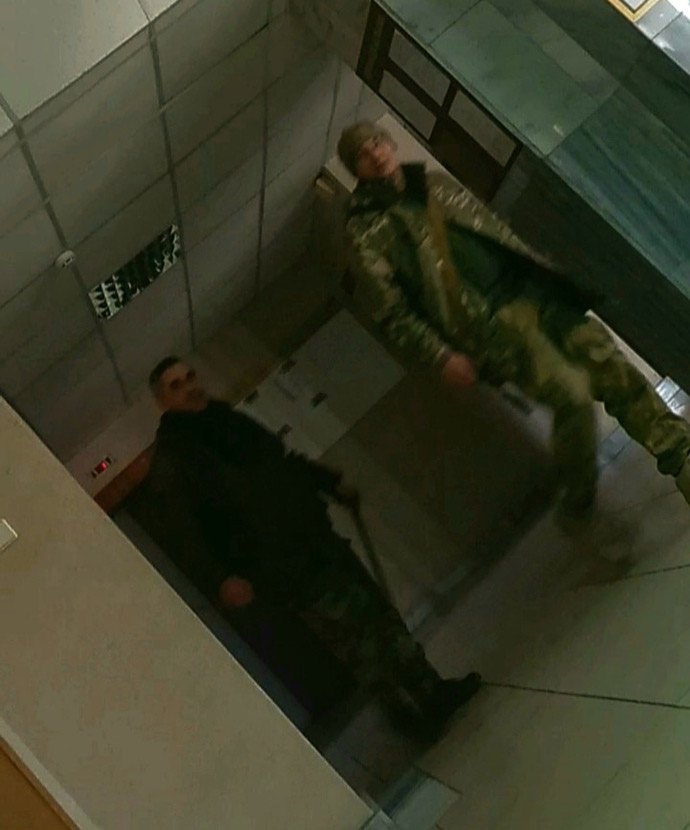 Russian military in occupied Enerhodar, March 2022PHOTO: VIKTORIIA ROSHCHYNA
Russian military in occupied Enerhodar, March 2022PHOTO: VIKTORIIA ROSHCHYNA
Nuclear workers still do not understand who managed the attack of the city at that time, emphasising that there were different units there: Wagner Group mercenaries, Kadyrovites [a Chechen paramilitary group supporting the Russian Armed Forces - ed.], the regular Russian army. However, the former head of the ZNPP Ihor Murashov remembers the first morning during the occupation, 4 March 2022. Then, together with the mayor Dmytro Orlov and the local police chief, the occupiers summoned him for a conversation at 06:30 in the morning.
"Two 'Tigers' [armoured vehicles] arrived. Military personnel came out of them. Some Russian generals," Murashov recalls, "They told me to go to the station and warned that now we will be guarded by the Russian Guard." The same morning, the occupiers captured a few defenders of the National Guard guarding the station and took away their weapons.
The NPP's employees say that the commandant of the facility is the most important person at the plant. The Russian Guard and representatives of the so-called "LDPR" [self-proclaimed Luhansk and Donetsk People's Republics] who guard the station are subordinate to him. At the beginning of the occupation of the city, the military was led by General Valery Vasiliev.
It was he who made radical statements such as: "The station will be Russian or no one's." However, he has not been seen in the city lately. Employees emphasise that the Russians undergo frequent rotations.
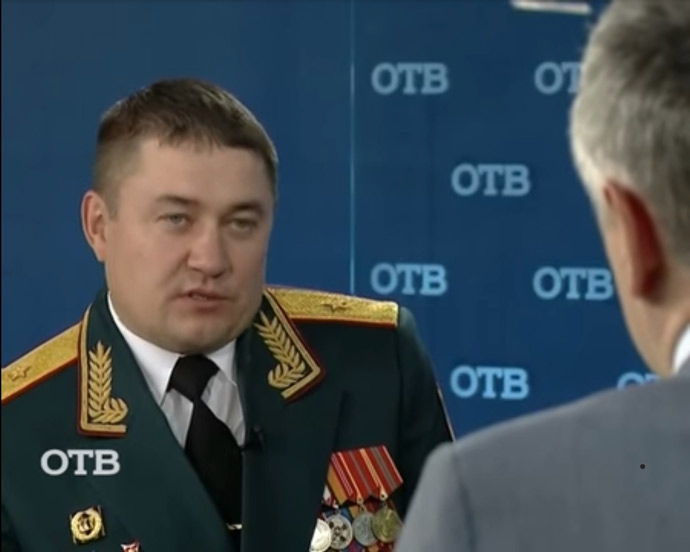 Russian general Valery VasilievSCREENSHOT FROM THE VIDEO
Russian general Valery VasilievSCREENSHOT FROM THE VIDEO
In addition, there are other units belonging to the occupiers present at the site, which, according to the nuclear experts, operate autonomously. These are Kadyrovites and Wagner mercenaries.
Representatives of the Crimean "Berkut", which is part of the Russian Guard, were engaged in guarding the coast of the Kakhovka reservoir. Our analysis of social media and the occupiers' videos provides evidence of this. According to employees of the nuclear plant, 500 to 1,000 Russians are living permanently at the station.
"The number of military personnel has increased. They are mainly representatives of Akhmat [Akhmat is a unit from Chechnya, the most elite formation of the Chechen special forces]," says nuclear engineer N., who still works at the station. "They really liked our city, they were here as if they were at a resort," says another nuclear engineer B. and adds that the Kadyrovites are in a privileged position there.
"There are different divisions," says the former head of the station Ihor Murashov. "And they all believe that the safest place is a nuclear power plant, because the Armed Forces of Ukraine will never shoot there. That's why all units - whether Wagner, Akhmat, or Rosgvardiya - are trying to be located at the NPP. They live there, wash and hang up their underwear, s**t under Christmas trees.
Women go to work in the morning, and they [mercenaries, Russian soldiers] run around the station in their underpants." Right from the early days, the military have been keeping their equipment at the station, and from there they opened fire on Nikopol. "There were up to 50 pieces of equipment. These are armoured vehicles, Urals, specialised vehicles," says nuclear engineer T.
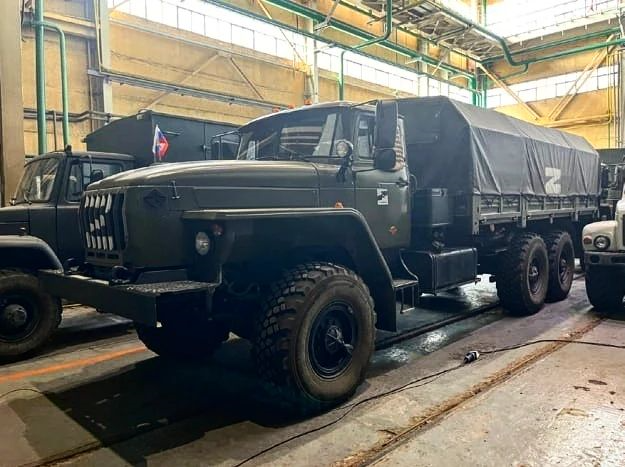 Equipment of the occupiers on the territory of the ZNPPPHOTO: ENERGOATOM
Equipment of the occupiers on the territory of the ZNPPPHOTO: ENERGOATOM
"Every day we see how they leave at six in the morning.
They attack, and then go back," adds N., employee of the nuclear plant. "They even dragged two tanks to the site," Ihor Murashov recalls. "There were a lot of transport vehicles, which they hid under flyovers so that they could not be seen by drones. I did not see any Grads there, there were definitely two guns, also vehicles with ammunition."
According to the workers who remain under occupation, the Russians are currently strengthening their positions at the station and are continuing to mine the surrounding area. "Additional personnel were brought to the station, machine-gun positions were set up on the power units above, and checkpoints were set up," says nuclear engineer T., who is still in occupied Enerhodar, but has not signed a contract. "Well, this is also done in order to prevent the staff from leaving in the event of an emergency.
After all, without them they would not be able to control the situation", adds the ZNPP employee.
Rosatom
A group of 10 Rosatom representatives arrived at the ZNPP during the first days of Enerhodar's occupation. "They presented themselves as mediators between us and the Russian soldiers. They made sure we weren't lying to them," Ihor Murashov recalls. "They kept saying: 'Get over it, Russia is here forever.
Those who will stand with us will keep their jobs. Everyone in Russia dreams of working either for Gazprom or for Rosatom." Murashov said that initially the Russians would say those things mostly to the ZNPP management.
"They said that everything here was now Russian and that 'our joint task is to make sure people couldn't feel this transition and wouldn't suffer'," I., a ZNPP administrator who later fled the occupation, recalls. She says that the ZNPP staff were able to back up all of the crucial information from the ZNPP servers and destroy all of the original data in order to prevent the Russians from taking a hold of it. In October, Russia established a shell company called the Zaporozhskaya Nuclear Power Plant with an office in Moscow and headed by Oleg Romanenko, a Rosatom representative.
ZNPP employees believe that this was done so that Rosatom could circumvent the sanctions.
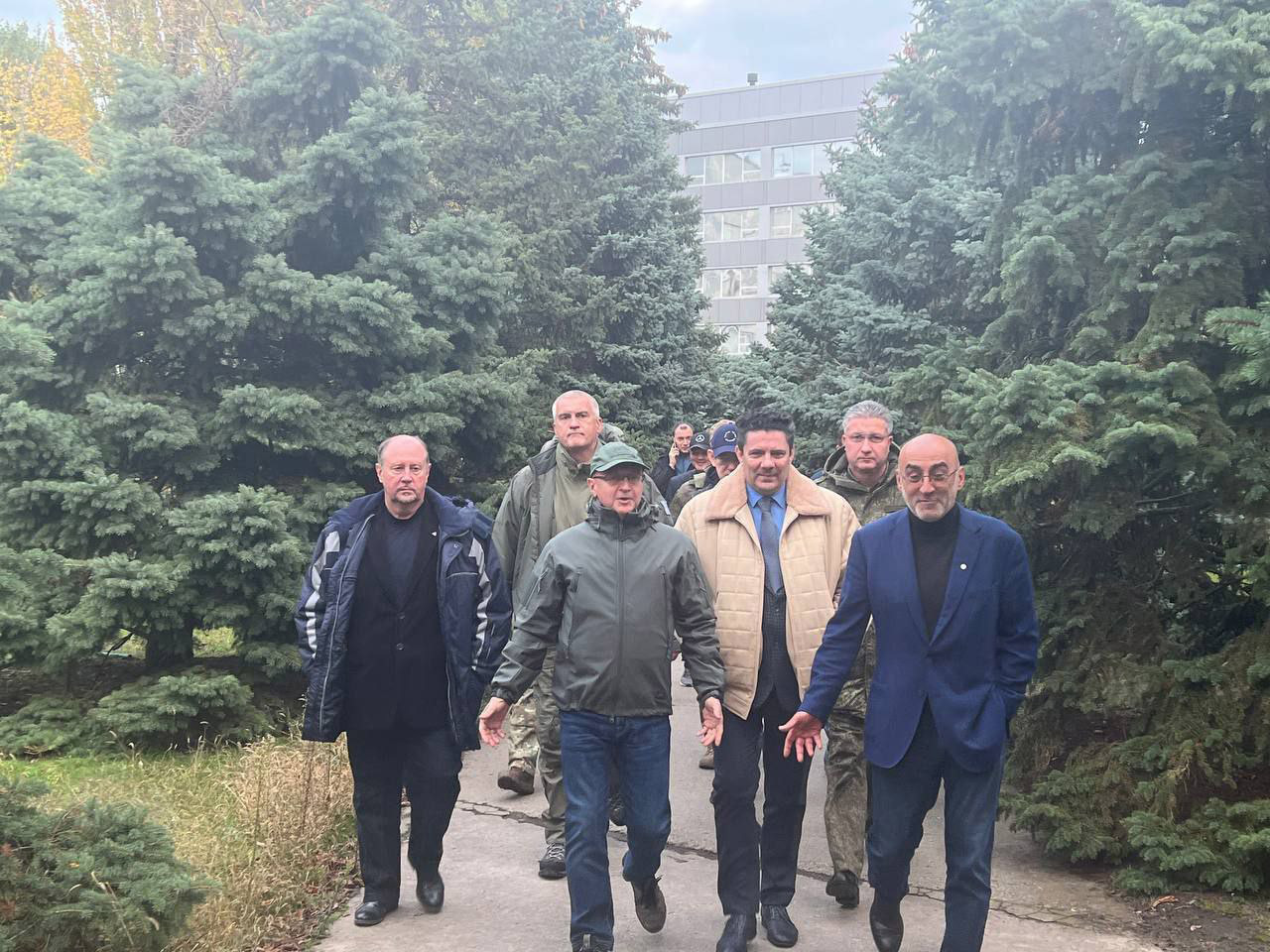 Yurii Cherniichuk, deputy chief engineer at the ZNPP, defected to Russia and took on the role of the plant's director. Cherniichuk is in the centre of the photo, wearing a tie.Photo: Aksyonov on Telegram
Yurii Cherniichuk, deputy chief engineer at the ZNPP, defected to Russia and took on the role of the plant's director. Cherniichuk is in the centre of the photo, wearing a tie.Photo: Aksyonov on Telegram
Russian occupation authorities appointed Yurii Chernichuk, a ZNPP engineer who collaborated with the occupiers, as the head of the power plant. Chernichuk had been working at the ZNPP since 1995 and had worked his way up from a reactor department operator to deputy chief engineer.
His colleagues say he was under pressure, but they are convinced that he had a choice whether to collaborate with the Russians. The ZNPP staff say that around 60 Rosatom employees have recently been spotted at the power plant during a rotation, instead of the usual 10.
International Atomic Energy Agency
Russian forces started to regularly shell Enerhodar and the Zaporizhzhia NPP in July 2022. "They claim it's the Armed Forces of Ukraine.
But we're not fools, we can hear it all. We hear them launching the rockets and the explosions that follow two seconds later," says D., a nuclear energy engineer who was able to flee Enerhodar for Ukrainian-controlled territory, via Crimea. When asked about the worst day under Russian occupation, most people we spoke with mentioned 1 September, the day when the International Atomic Energy Agency (IAEA) mission visited the ZNPP.
"That day they put on a real show. Tanks, helicopters. They shelled the residential neighbourhood," says I., a ZNPP employee. "They claimed they were repelling a Ukrainian sabotage group, which was allegedly trying to approach the city by boat.
Of course none of this was true, but it was still scary. People started leaving the city en masse. They [the Russians - ed.] were also the ones to shell the plant.
We could hear it all. The speed of sound: a projectile being launched, then exploding," I. tells us. "Not a single person at the power plant got injured.
All of this action - where to aim, when to fire - was coordinated from the top floors so as to avoid casualties," Ihor Murashov says. IAEA representatives have been living in the ZNPP health unit since autumn 2022. There are currently two of them, though some of the power plant staff remaining there say there are three.
They work according to a schedule. At 09:00, they hold a briefing, telling the power plant employees where they want to go, what documents they want to review, and what they want to research. "We arranged all of this together with them," Ihor Murashov says. "They would often ask to inspect machinery in the turbine hall.
We had to coordinate everything with the Russians, including the route the inspectors were going to take through the plant. In the afternoon, around 15:30, they [the IAEA inspectors - ed.] went back and told us what they did that day, what they would cover in the reports they would send to Vienna," Murashov says. The ZNPP staff stress that they had high hopes for the IAEA mission, but were disappointed.
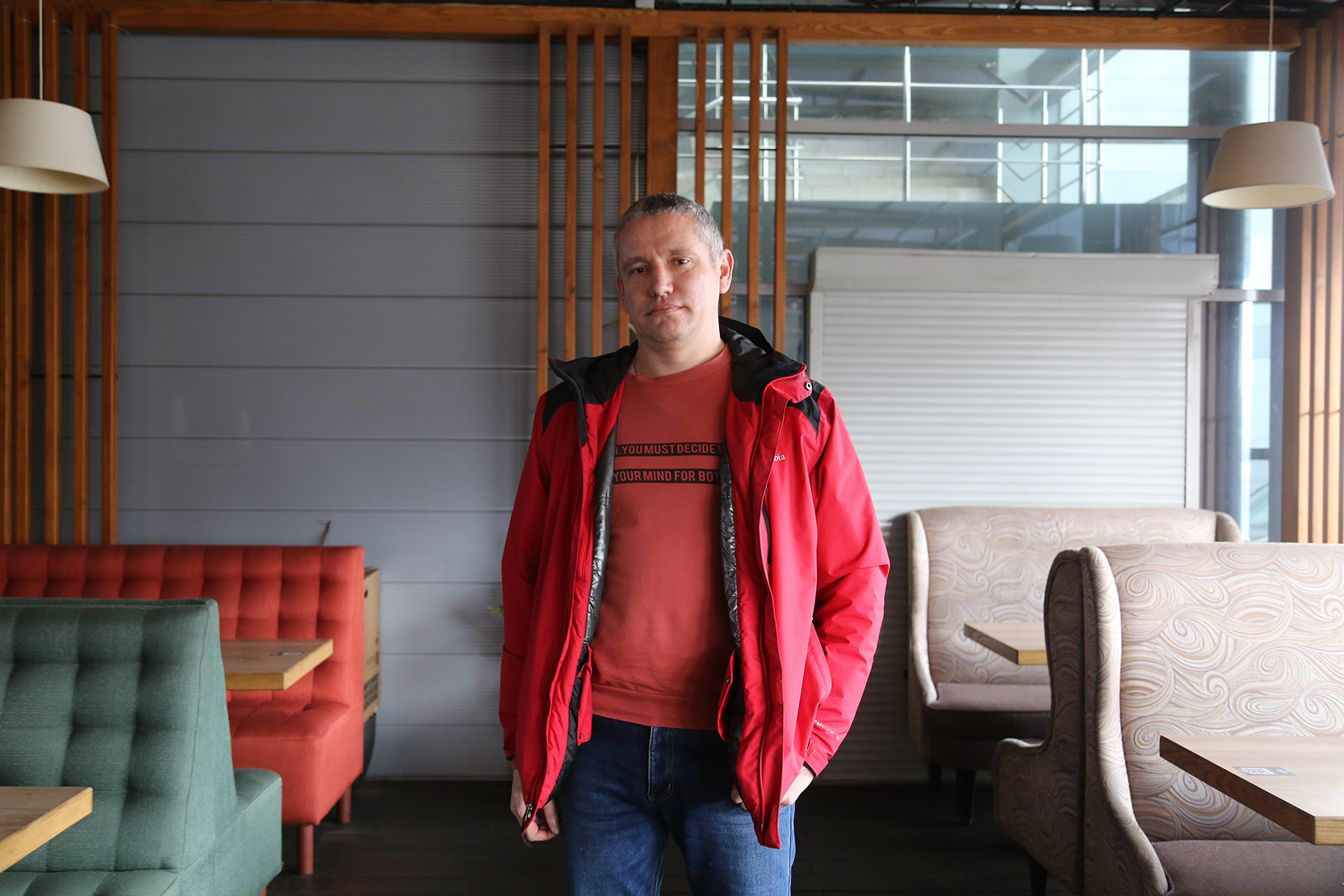 Dmytro Shmydt, a ZNPP employee who was able to escape. March 2023Photo: Viktoriia Roshchyna
Dmytro Shmydt, a ZNPP employee who was able to escape. March 2023Photo: Viktoriia Roshchyna
"What the IAEA is doing here is a great mystery," Dmytro, a ZNPP employee, says. "The IAEA is not doing anything and it has no influence over anything," V., a ZNPP employee who remains under Russian occupation, says.
He seems indignant. "They are only 'concerned', as ever. They were seen at a restaurant before the New Year, celebrating with the Chechens." Before the IAEA's autumn visit to the ZNPP, Energoatom CEO Petro Kotin said that the mission was being unduly influenced by the Russian Federation, since at least a quarter of its leaders were Russians.
For instance, Head of the IAEA Nuclear Energy Department and its Deputy Director General is Mikhail Chudakov, a Russian citizen who spent 10 years working at the Kalinin Nuclear Power Plant, some of that time in management roles. The Russian occupation regime has brought in a number of Kalinin NPP employees to work at the ZNPP. ZNPP employees who remain under Russian occupation also note that members of the IAEA mission are often accompanied by Russian special services. "They don't go anywhere by themselves," N., a ZNPP employee, says. "[Russian] Federal Security Service officers are constantly monitoring where they are going, what they take pictures of, and what [the ZNPP staff] say in response to their questions."
Energoatom has not offered any comments on the work the IAEA mission is carrying out at the ZNPP, stressing that this is the Foreign Ministry's domain. Ukraine's Foreign Ministry has not responded to Ukrainska Pravda's request to comment on the IAEA's work at the occupied Zaporizhzhia power plant.
Risks and threats
"The first threat is that they will hire people who don't have the necessary knowledge and qualifications. The second is the drop in water levels.
Sluices at the Kakhovka Hydroelectric Power Plant have been wrecked and water is escaping. Its level is minimal and is not being controlled. Though the [ZNPP] power units have been turned off, they still need to be cooled.
If there is no water, a Chornobyl-scale event will occur," V., a nuclear engineer who remains under occupation, says. The ZNPP is currently not producing power. It takes around 100MW from the Ukrainian power grid for auxiliary needs.
"We need this power to cool off certain systems," Enerhodar Mayor Dmytro Orlov says. "Fuel has to be cooled continuously over the course of several years even if the plant is not operational. So these pumps are working to ensure nuclear security." Energoatom says that the power plant's shutdown and the shutdown of all of its power units causes a gradual degradation of all systems and equipment, since the correct temperatures are no longer maintained and the power units are out of service.
Energoatom also stresses that the presence of the military and Rosatom representatives at the plant is unacceptable. "We all realise that depending on the people they bring [to the ZNPP], they can do whatever they want," Ihor Murashov says. "Mines have been planted all around [the power plant] and we don't know what will happen if they are pushed out and they start to leave." The ZNPP employees who remain under occupation emphasise that the lack of regular communication with Energoatom, and not just the constant pressure from the Russians, puts them in a mentally taxing situation.
"We don't really understand the National Nuclear Energy Generating Company's current agenda," says N., a ZNPP employee. "We used to have a person who mediated our interactions with [Energoatom], but he has signed a contract. And now, for example, our 'new management' is talking about 'pre-launch works' but we don't know who to listen to and what to do..." The ZNPP employees say that representatives of Rostekhnadzor [the Federal Service for Environmental, Technological and Nuclear Supervision, the supervisory body of the Russian government on ecological, technological, and nuclear issues - ed.] also sometimes visit the power plant.
"They came and told us 'We will soon restart a power unit.' We asked how, and they said 'Well we'll just push the frontline 100 km forward.' We laughed at them..." N., a ZNPP employee, says, adding that it is impossible to restart the plant while the war is still ongoing. "We have to supply power to the grid, but the Ukrainian Armed Forces won't let us supply power to [Russian-occupied] Crimea, and [the Russians] won't let us supply power to Kyiv. Even a single shell might cause a blackout and risk disastrous consequences."
Energoatom stresses that the only way to avoid a nuclear disaster is for Russian forces to withdraw from the power plant and for Ukraine to regain control over it. "The only way out is liberation," Dmytro, a nuclear engineer, says about the ZNPP's future. "If Vasylivka and Melitopol are liberated, [the Russians] will withdraw from the power plant of their own accord. They will realise they have been encircled and they will retreat," Dmytro is convinced.
Ihor Murashov, the former head of the ZNPP, is also convinced that he will soon be able to resume his work at the power plant. "We know how to restore the power plant and what needs to be done for it to become operational again and to supply 25% of Ukraine's power."
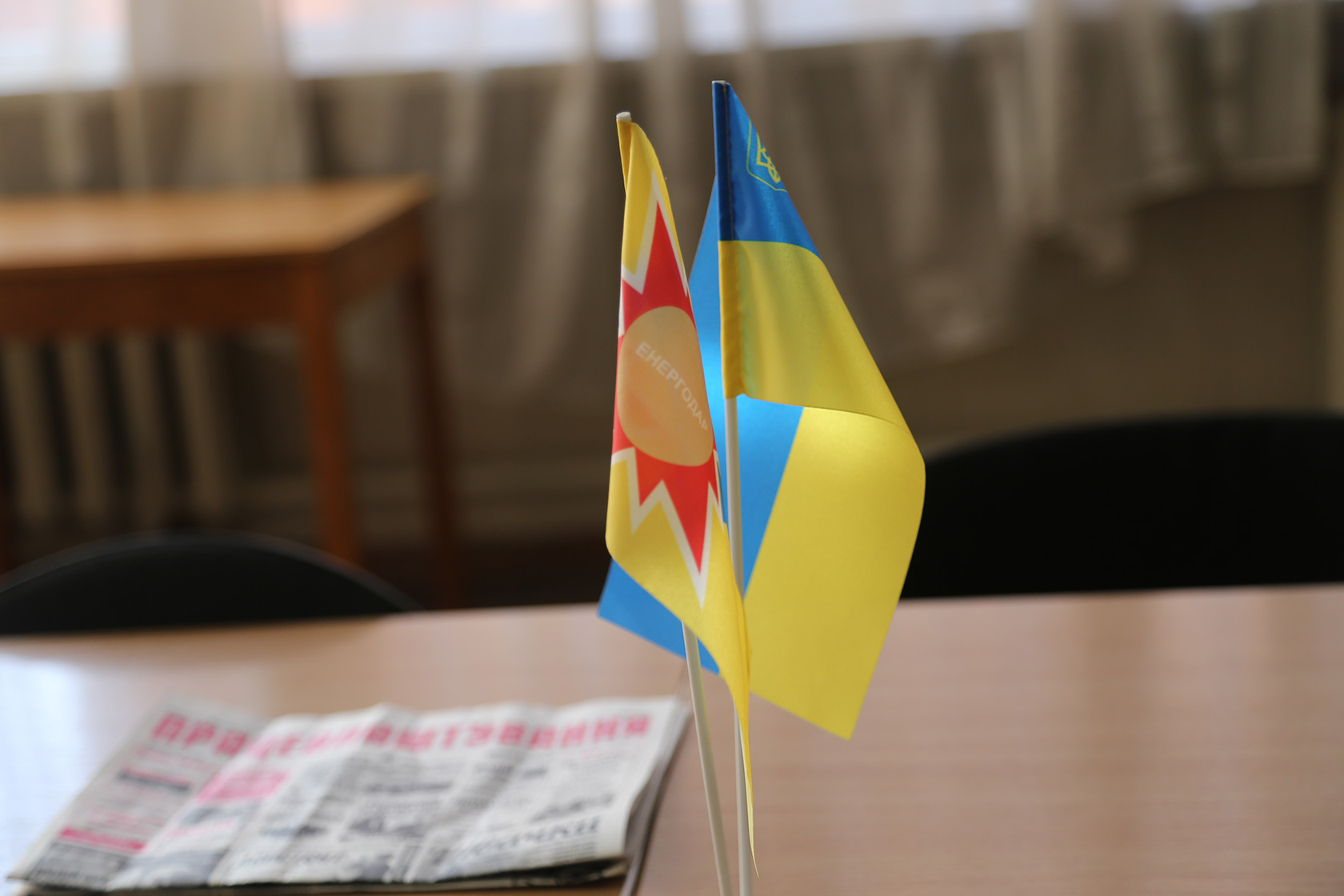 The flags of Enerhodar and of Ukraine flying over the headquarters for internally displaced people, March 2023Photo: Viktoriia Roshchyna
The flags of Enerhodar and of Ukraine flying over the headquarters for internally displaced people, March 2023Photo: Viktoriia Roshchyna
Viktoriia Roshchyna for Ukrainska Pravda Translated by Myroslava Zavadska, Elina Beketova and Olya Loza
Edited by Susan McDonald